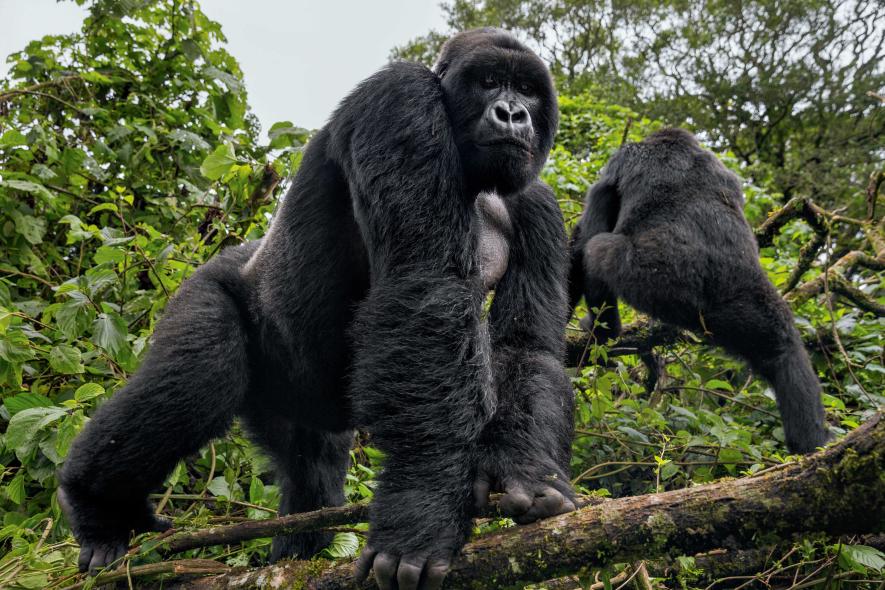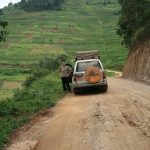Best Rwanda Gorilla and Excursions Tour Experience

On your tour in Rwanda, you can participate in a lot of tour experiences which can give you unforgettable memories and some of the most popular ones include the following;
Dian Fossey Museum. The Dian Fossey Museum is found in Musanze just outside Volcanoes National Park Rwanda in between Mount Bisoke and Mount Karisimbi. Dian Fossey museum is about 2 hours’ drive from the heart of Kigali. This is where Dian Fossey used to stay and its where she used to make her research from. This museum is where the belongings of the late Dian Fossey are kept and even the remains of some poached gorillas can be found here conservation and protection. Apart from this museum, sometimes Dian Fossey used to relax at Hotel Muhabura. It is only at this museum where primate travelers can get facts about the success story of gorilla protection and conservation.
The museum was founded in remembrance of Dian Fossey for her big role she played about the protection of gorillas. It is highly recommendable for someone to pay a visit to this museum after or before gorilla trekking. It was founded to help extend Dian Fossey Fund conservation and education initiatives to students and communities adjacent to the park. A suggested donation of $20 per adult is requested while on your tour at Dian Fossey Museum.
On your visit to Dian Fossey Museum, you can still go for a hike at Dian Fossey’s graves in case if you get a chance. This hike is started by following the footsteps of Dian Fossey. Dian Fossey was a famous American Primatologist who spent 18 years in the forest working towards saving the mountain gorillas from extinction. She is the lady premiered in the popular 1988 Movie “Gorillas in the Mist” which brought attention of the mountain gorilla conservation to the world. She was buried in the same area with one of her favorite gorilla Digit.
IbyI’wacu Cultural Village. IbyI’wacu cultural village is one of the community owned enterprises in Rwanda which was started with a major aim to address local community conflicts with mountain gorilla conservation around Volcanoes National Park in Nyabigoma Kinigi in Musanze district north of Rwanda.
IbyI’wacu people used to depend on Volcanoes National Park resources through illegal poaching for bush meat, timber, wood and water collection and wild honey gathering which were restraining conservation of gorillas and other wildlife. Later these people were taught about the goodness of protecting wildlife and a demarcated piece of land was given to them and that’s where they are currently staying.
People from IbyI’wacu Cultural Village involve in various projects with the aim of changing the lives of people through enterprise development where individuals use arts and crafts to start up community-based tourism business which helps them to earn a living from sale of craft products to tourists who come to visit the village.
The cultural village also provides conservation support through educating locals about sustainable agriculture projects including vegetable growing, bee keeping, goat rearing as alternative resources of livelihood apart from depending on the forest products.
In 2011 the village successfully initiated a project called “goats for gorillas” with the aim that for each tourist who goes on gorilla trekking safari, gives an amount equivalent to a goat which goes to every local household living near volcanoes national park. There is no much poaching in Volcanoes National Park since the IbyI’wacu people no longer depend on the bush meat but rather depend on the income they generate from sustainable farming and goat rearing which guarantees economic and food security.
People who visit IbyI’wacu Cultural Village have an opportunity to explore the unique traditional rural life of Rwandan culture, traditions, beliefs with well-established activities that tourists can engage or participate in with the help of experienced local guides who will share stories about their lifestyles.
Anyone wishing to experience the best of Rwanda’s distinct cultures and traditions, the best place he or she should visit is IbyI’wacu Cultural Village. On your visit to this village, you can get the opportunity of enjoying traditional dances, music and drama performed by the local residents. You will listen to different local musical sounds such as Ibyivugo, Umuduri, Amakondera, Ingoma, Agakenke, Iningiri, and others.
The amazing bit about these sounds is that they are unique to each other and special instruments are used to play them. The Intore dance is performed by men with little bells wrapped around their legs. The young and energetic men and women dance with endless smile and happy faces. To enjoy more of their performances, it is advisable to at least spend a night with them and tourists sleep over in hunts within the village. A visit to IbyI’wacu Cultural Village you pay USD35 per person.
Musanze Cave. This cave is located 2km from the town center along the road to Gisenyi in Musanze district particularly in Ruhengeri. It can also be accessed through the road that goes to Kinigi. This cave is believed to have resulted from volcanic activity where the lava formed several layers and hence leading to creation of Albertine Rift Valley. Musanze Cave is a tourist attraction in Rwanda a home to thousands of Bats. You can visit Musanze Cave at only 55USD.
It said that cave no longer gets high number of tourists due to high price entry though it is worth visiting. Operators say that the increase in price came after denying people from paying through the Rwanda Development Board office in Musanze but rather to pay through the Rwanda Development Board office which is beyond Kinigi.
The amazing thing about visiting Musanze cave is that you are in position to explore the unique art pieces showcased by the locals.
Before entering the caves, tourists are provided with helmets to protect themselves from the bats, tourists are always advised to cover their mouths when in the cave and advised to use torches because of the darkness in the caves. When in the cave, tourists are advised to move within their group and not divert because the cave has a lot of corners, hence can end up getting lost.
Musanze caves have more than 31 entrances and they all give access to the interior part of the caves. The main entry size to the caves is as small as that of the cathedral. Exploring Musanze caves entirely involves walking through the 2km long dark tunnel with hardened rocks.
Things to move along with on your cave exploration in Musanze include strong torch, head cap, helmet, hardy gloves, good hiking or walking boots, snacks, bottled water, insect repellent, rain jacket among others.
In addition to exploring Musanze caves, tourists can also take on different activities including hand-on experiences like basket weaving; learn how locals use hunting tools like bows and arrows; local beer making – Ugwagwa and they will also show you the local brew that they make using a particular banana species. On your tour to Volcanoes National Park, a visit to Musanze cave must be added to your package.
Azizi Life Experience. Azizi Life specializes in hosting families, mission teams and school groups.
All the Azizi life Experiences start from the main office and boutique in Byimana, Ruhango in the Southern Province about 1 hour drive from Kigali. All these experiences were discovered by the Artisans. The Artisans are parents and grandparents, they are farmers, they are friends, and they are role models. They laugh and bring laughter, they cry and comfort those around them, they live life and impact their communities in a unique way. These groups of remarkable women and men are supporting and coaching one another in their craft and in their lives as a whole.
On your day of engaging in the Azizi Life Experience, you join your artisan hostesses in their village for a morning of family chores, a simple, home-cooked lunch and an afternoon for learning how to craft. All the experiences carried out, you have to move along with a good translator, you will love sharing life, work, conversation and laughter with the artisans and their families.
There are a lot of activities carried out in this Azizi Life Experience which include traditional pottery, traditional coffee experience, Imigongo Experience (cow dung art), traditional construction, banana juice making, traditional cooking day, traditional drumming and dancing, candle dipping and hive making, home stay experience and crafting workshop experiences. Among the those many activities, the choice is in the hands of a tourist to participate in what he or she wants. Azizi life experience activities take a full day. All the activities you participate in requires you to start with collecting all the materials you need to engage in that activity. For example, you can see as below;
For those participating in traditional pottery experience, you will start your day by going out into the fields or gardens to dig up and gather all the different materials you will need. After collecting the materials, you will then be guided by artisan experts on how to clean and prepare the clay ready for molding into the design of your choice. After your done with molding your desired pottery, you will leave it in sun to dry. You can have lunch and storytelling as your waiting for pottery to dry.
After all your items have been successfully dried and cooled down, you will have farewells and then drive to the Azizi Life office where you will refresh with a cold soft drink. You can also go for shopping of some of the beautiful crafts made by the Azizi Life artisans.
Traditional Coffee Experience, this experience is mostly done during the coffee seasons between the months of March and August. The experience starts with a drive to a nearby village where you and your Azizi Life facilitator will be welcomed by the ladies of the cooperative.
After the introductions, you will head to the field to check on the coffee plants and harvest some of the ready cherries. Once collected, the cherries will need to be washed before removing the pulp and you will have to go down into the valley to collect the water.
At noontime, you will have some simple local meal with your host family with plenty of time to chat and learn about each other’s lives. After lunch, you will then roast, grind and sieve the beans before they can be turned into the perfect cup of traditional Rwandan coffee. You will enjoy working with the ladies as you go through the process and we can assure you will also be laughing together with them. You will end your day at the Azizi Life office where you will relax with a cold soft drink.
Traditional Construction, Azizi Life Experience is your chance to learn something about the traditional building techniques, some of them used since the times of the King.
This experience starts with collecting water and soil which you will use to make mud bricks for constructing. After making your own bricks, you will dig the foundations and learn how to lay the bricks so as to ensure the building will be strong. During the construction process, you will your simple home-cooked lunch with your host family.
In the afternoon, you go and collect banana leaves, which you will be taught how to make into a strong rope that can then be used to lash wood together to make a roof. After the completion, you will end your day at the Azizi Life office before going back to your accommodation.
Banana juice making, this banana juice is usually served at Rwanda weddings and other celebrations. This experience starts with collect the green bananas and the leaves needed to make the juice.
After you will open the hole where ripen bananas were buried 4 days before your coming and remove ripe ones only. Head into the valley to collect water. Come back and have lunch. After lunch, you will then peel, mash and strain the bananas using traditional techniques in order to squeeze out that local juice. After the process, you can taste and later return to your home stay.
Traditional Cooking Day, this cooking experience starts in the gardens with learning how you plant or harvest fresh ingredients for your meal you are going to prepare. Select from a simple variety of seasonal dishes for your custom traditional cooking experience with a rural mama.
Once the ingredients and water have been collected, food preparation begins with washing, peeling, pounding, and grinding the ingredients using traditional methods and tools.
Throughout the process, your hostess and the ladies of the local cooperative will teach and guide you, always allowing you to experience the day at your own pace. Once your meal has completed cooking in the outdoor kitchen, it will be time to enjoy.
Traditional Drumming and Dancing, Your Azizi Life Musical Experience begins with a mini-performance from a small troupe of traditional performers. Next, it is your turn to put on a traditional costume and give it a try. You will have fun as the dancers teach you some basic dance steps and share a bit of the history of Rwandan dance. After some practice time, the expert dance instructors help you put everything together in a performance of your very own. Don’t worry an Azizi Life team member will be on hand to catch the whole thing on your camera or phone.
After a break to catch your breath, the drummers will teach you some traditional beats, or you can even do a bit of free styling of your own on the traditional drums.
Candle Dipping and Hive Making, Be part of a beekeeping cooperative for the day. This experience begins with a drive to a nearby village where you and your Azizi Life interpreter will be welcomed by the men and ladies of the cooperative.
After introductions from your hostess, a morning of family chores begins. You collect water from the valley spring, prepare the fire for candle dipping and gather the materials and learn how to make your own traditional beehive.
At noontime, you will have your lunch with plenty of time to chat and learn about each other’s lives. After lunch, you will join with the artisan cooperative for an afternoon of candle making. You will learn how to prepare the wax and then the artisans will teach you how to dip your own pair of bees wax candles that you get to take home with you. You will love working with the artisans as you dip and laugh together. Return to your accommodation for dinner and overnight stay.
Cow dung art Experience, years ago in Rwanda, there was a prince who decided to decorate his house by molding geometric shapes onto the wall of his hut using cow dung. This technique was developed into a popular form of traditional Rwandan art called “Imigongo.” During this Experience, you will learn the history and technique of Imigongo art and then make your own piece to go with back home.
At noontime, you will have a simple local meal with your artisan teacher. After lunch, you will resume to painting.
Home Stay Experience, an overnight Experience is a unique opportunity to participate in the life of a rural artisan (Maama) and her family. Home Stay hostesses live in homes made of mud brick which usually have one larger front room for receiving visitors and a few smaller bedrooms for the family. In the enclosed area behind the house, there is an outdoor kitchen, enclosed pit latrine and bathing outhouse, animal stalls and family workspace. Most host families have about four children at home. In Rwandan culture, guests are considered a blessing and am very sure they will tell you to spend a night with them.
Intore Dance. Intore dance is sometimes called the Dance of Heroes. The word “Intore” translates to “the chosen ones” in the Kinyarwanda language, reflecting the elite status of the dancers who were selected to perform for the king. The dance served as both entertainment and means of displaying loyalty to the monarchy.
It is a traditional dance performed by Rwandans. Women were not allowed to participate in this dance but due to political change to ensure gender equality, they are now allowed women to participate in Intore dance in some ways mainly as drummers.
In pre – colonial times, Intore dance was a war dance performed by the Tutsi military. Dance numbers were often war-themed and the performing men carried actual weapons.
The Intore dance is performed by men with little bells wrapped around their legs. The young and energetic men and women dance with endless smile and happy faces.
The Intore dance is characterized by its dynamic and energetic movements accompanied by traditional music(instruments) and singing. The dancers both men and women wear colorful costumes adorned with vibrant patterns and feathers representing different aspects of Rwanda culture.
The dance is also characterized by graceful leaps, vigorous footwork and it also shows some elements of Rwanda life activities such as hunting, harvesting and celebrating victories of wining battles.
Each movement in Intore dance carries a symbolic meaning, reflecting the history, tradition and values of Rwanda people.
On your safari to Rwanda, you should not miss the Intore dance to witness the rhythmic beauty of this dance where tradition, artistry and history intertwine to create a truly unforgettable experience.




0 Comments